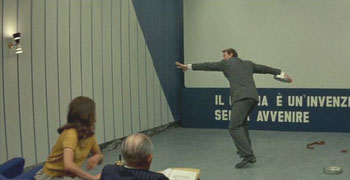
- There are perhaps no films that stay with me quite as much as those that challenge genre, audiences, or film itself--and Close-Up manages to accomplish all three.
- Questioning the criteria of what's documentary and what's not, Close-Up is essentially a re-enactment of actual events, mixed with live documentary footage and an artistic shot or two as well.
- What I found most fascinating about Close-Up was its suggestion that filming reality is simply not possible. The main character(?) is asked by the court whether or not he is acting, as the camera is on him. One wonders, though, whether or not this is the documentary footage or a re-enactment?
- In reference to the "artistic shots" mentioned above, there is a rather wonderful long take in which a can is tossed off a pile of garbage by one person, and the camera follows it rolling down the street. Later, another person kicks it in celebration. Not particularly impressive in description but it references Kiarostami's interest in long takes and the rewards one can receive from them.
- Bit with Makhmalbaf at the end is rather affecting, and rather daring [or couldn't it be helped?!] decision to include the footage with constantly interrupted sound due to faulty mic.
10/masterpiece





